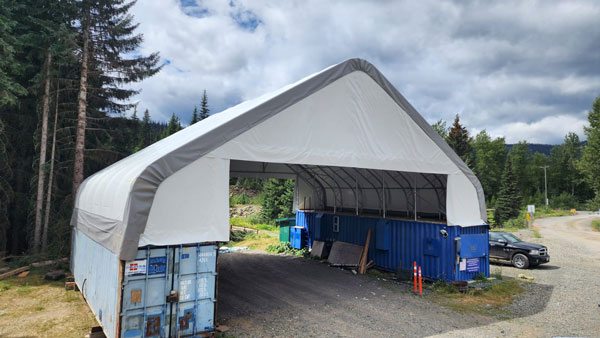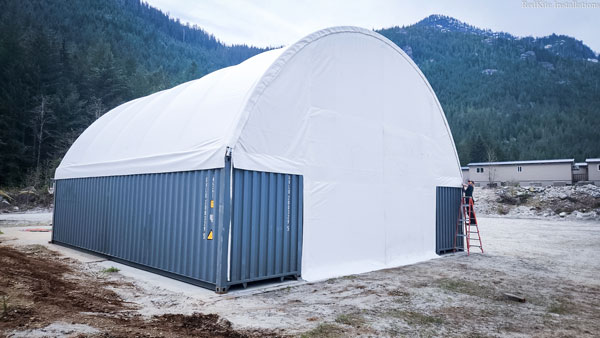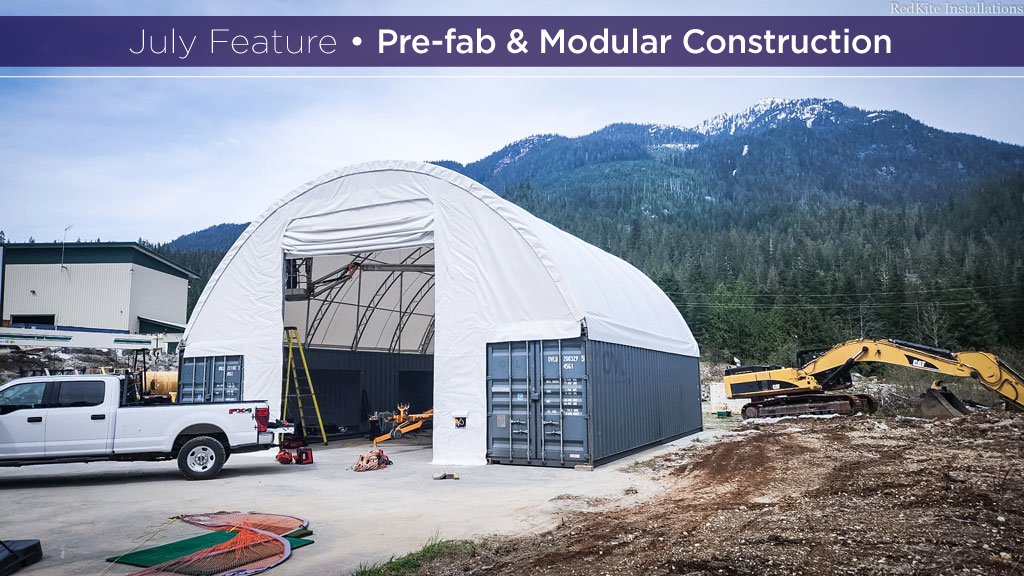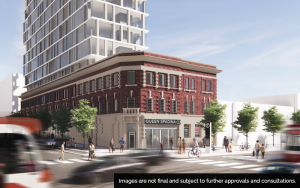With more inclement weather events occurring, shipping containers are being adapted to do under-cover work providing not just office and storage space but with a canopy span that can house large equipment or serve as a mechanic’s bay.
There are three types of prefab spans, said Christina Chiasson, product manager of modifications for BigSteelBox, which supplies containers and modifies them according to the business client’s use. Container modifications can range from insulation to electrical services to set up an office or storage area. For a span, the two modified containers are used in a parallel configuration.
“There is the hoop tent (an upside down U), the wood truss type (provided by truss makers or a carpenter to form an inverted V) and then there is the metal roof type,” said Chiasson.
But, before any span is placed on the containers, there needs to be an understanding of modifications being made to the container (office, storage, windows and doors) and how those modifications will impact its structural integrity combined with the span’s impact on the container. As well, she said, the foundation at the site needs to be engineered to withstand the proposed loading.
Chiasson said her company works with a client to fulfill the container requirements and helps find a span supplier that can work with the specifications yet meet the customer’s needs. The containers arrive onsite first and are set up.

“The roof people come after us and install the roof (or use a third-party installer),” she said, adding BigSteelBox works with an approved list of installers.
Experienced installers understand the stresses that the span will encounter.
“Wind is the big one,” she said.
Larger and higher work spans areas can be created by either stacking containers onsite to house larger pieces of equipment or by aligning containers (a 40-foot container with a 20-foot unit) for larger work space.
Spanned containers have been adopted by industries such construction, oil and gas and mining.
“Large infrastructures such as Site C, they use them as laydown areas for heavy equipment,” she said.
The projects are usually longer term and the configuration has the ability to be dismantled and moved to the next large worksite.
Stabl Shelters is known for supplying stock ready-to-use fabric spans for containers. General manager Cuau Nieto said he sees a steady demand for container spans but the demand spikes as companies head toward winter and need shelter.
“We don’t provide the containers – they either have them or plan on buying them,” he said.
The company ships out a poly vinyl coated fabric shelter with a steel frame available in different sizes and configurations to fit on containers.

“We always have one or two in stock (in the size required),” he said, adding a company salesperson deals with clients on the phone to obtain the required measurements and then lays out the best size option.
Stabl Shelters supplies both a round oval structure and an arched configuration and the width can go up to 60 feet. The units can be purchased with a back wall and a front wall that includes a garage-style door.
Nieto said a skilled installer is key to the success of the span and container to ensure they are on solid footing and are weighted and that the canopy is successfully anchored to the containers to withstand wind and other environmental stresses.
Nieto said because the spans are stock sizes, the turnaround time to get them to customers is short.
“We also can offer an installer list,” he said.
Custom orders though can take 13 to 16 weeks to fill.
Future Steel Buildings customer care advocate Paul Algar, based in Toronto for the North American company, said companies are finding the steel custom-manufactured canopies are a quick and relatively inexpensive means of providing a roofing solution.
“They are being used as a small base shelter for large equipment, a covered workshop and for temporary shelters for construction companies and also as emergency shelter situations,” he said, adding four to six weeks are needed to produce a custom order.
Algar said the company spans can fit onto single or double stacked containers and are produced in five-foot increments up to a total span width of 60 feet. The U.S.-based company ships by truck throughout North America but Canadian units are manufactured in Ontario.
Ontario’s Metal Pro Buildings Inc. designs, engineers and sells prefabricated steel building systems globally.
CEO Herbert Broderick said the custom-designed spans for containers are produced in the company’s Mississauga plant. The units are shipped to customers that include the mining sector and general contractors as well as municipalities that use them for storage facilities. The steel spans can be fitted to containers that are double stacked to gain more height for storing larger equipment and Broderick estimates his company produces 20 to 30 spans a year.











Recent Comments